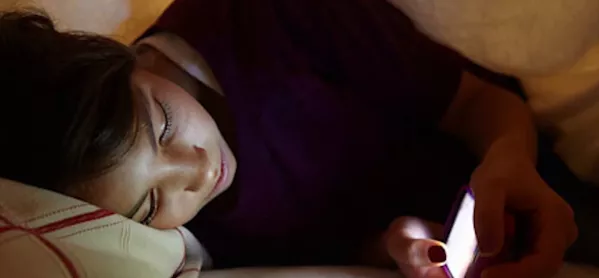A quarter of teenagers spend more than an hour on their mobile phones after going to bed, and it is affecting many young people’s school work, a new survey shows.
A quarter of students feel tired during the day because of how often they use their mobile device at night, according to research from the Headmasters’ and Headmistresses’ Conference (HMC).
Children as young as nine have been known to check their devices more than 10 times throughout the night, the HMC annual conference in Stratford-upon-Avon heard yesterday.
Stressed about FOMO
A survey of 2,745 11 to 18-year-olds in state and independent schools in England revealed that almost half (45 per cent) check their devices - often checking Snapchat, YouTube and Whatsapp - overnight.
Some 68 per cent of those said they thought their mobile phone use in the night affected their school work.
10 per cent of students said they’d feel stressed about the “fear of missing out” - more popularly known as FOMO - if they didn’t check their mobile device before going to sleep.
Mike Buchanan, chair of HMC and head of Ashford School, said: “As teachers we are seeing the effects of device use every day. Mirroring adults, pupils are constantly using their phones, quite often for productive purposes.”
“Clearly there are some times when children are not concentrating because they are tired, and that has an obvious impact on their ability to keep up with what’s going on - there is a desire to stay within the group,” he added.
Digital detox
Online safety organisation Digital Awareness UK (DAUK), who worked on the poll with the HMC, said they had found anecdotal evidence of children as young as nine checking devices 10 times a night.
Charlotte Robinson, co-founder of DAUK, said: “Students often tell us that they are exhausted due to the fact their mobile devices are flashing, buzzing and pinging throughout the night telling them what they’ve been tagged in, invited to, or who’s messaged them.”
The organisation - which deliver online safety training on issues such as cyberbullying, sexting and hacking - says schools should encourage young people to have a “digital detox” and put mobile devices away for 90 minutes before lights-out or keeping them out of the bedroom.
Last month, a survey of parents found that one in 10 said their child had been subject to online abuse. And campaigners warned that the start of the school academic year is the “perfect storm” for cyberbullying.
Ms Robinson added: “One of the biggest topics around at the moment is excessive social media consumption and how it is affecting our physical and emotional well-being.
“A lot of [the young people] are waking up sometimes with over 100 notifications from conversations that have happened overnight.
“They want to be that person that is responding at 1am, and seen to be quite cool, to make sure they catch the joke - it’s a huge driver, that anxiety of wanting to know what’s happened.”
Want to keep up with the latest education news and opinion? Follow TES on Twitter and like TES on Facebook




